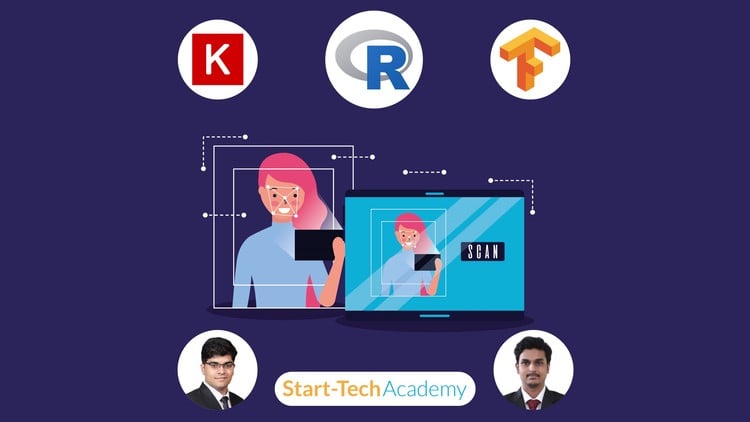
Deep Learning based Convolutional Neural Networks (CNN) for Image recognition using Keras and Tensorflow in R Studio
⏱️ Length: 6.6 total hours
⭐ 4.50/5 rating
👥 86,672 students
🔄 September 2025 update
Add-On Information:
Note➛ Make sure your 𝐔𝐝𝐞𝐦𝐲 cart has only this course you're going to enroll it now, Remove all other courses from the 𝐔𝐝𝐞𝐦𝐲 cart before Enrolling!
- Course Overview
- Dive into the foundational concepts of image recognition, unraveling how computational models are trained to interpret visual data effectively.
- Grasp the core architecture of Convolutional Neural Networks (CNNs), understanding their specialized layers and operations optimized for image processing.
- Explore the landscape of Deep Learning, recognizing its pivotal role as the driving force behind modern Artificial Intelligence capabilities in computer vision.
- Understand the systematic workflow of building deep learning models, from initial data ingestion and preparation to model compilation and preliminary training.
- Discover R Studio as a powerful, user-friendly integrated development environment for developing and executing sophisticated deep learning projects with ease.
- Appreciate the diverse real-world applications of image recognition, spanning critical industries from medical diagnostics and autonomous systems to security and consumer technology.
- Requirements / Prerequisites
- Basic R Programming Skills: A working knowledge of R syntax, fundamental data structures (e.g., vectors, data frames), and basic programming logic (loops, conditionals) will be highly beneficial.
- Familiarity with Basic Data Concepts: An understanding of variables, functions, and elementary data manipulation will significantly aid in a smoother learning experience.
- No Prior Deep Learning or Machine Learning Expertise: This course is meticulously structured to provide all necessary foundational knowledge from the ground up, ideal for absolute beginners in AI/ML.
- Access to R Studio Environment: Ensure you have R and R Studio installed on your computer, along with administrative rights to install essential packages like `keras` and `tensorflow`.
- Commitment to Hands-On Practice: Success in this course hinges on actively engaging with coding exercises, experimenting beyond the guided examples, and consistent self-practice.
- Skills Covered / Tools Used
- Designing Basic CNN Architectures: Learn to construct sequential CNN models, effectively incorporating convolutional layers, pooling layers, and dense layers for image classification tasks.
- Image Data Augmentation Techniques: Master various methods to artificially expand and diversify image datasets, significantly improving model robustness and preventing overfitting.
- Model Compilation and Training Strategies: Understand how to correctly compile deep learning models with appropriate optimizers, loss functions, and performance metrics for effective training.
- Performance Evaluation & Metric Interpretation: Gain expertise in evaluating model accuracy, precision, recall, and F1-score, and interpreting confusion matrices for nuanced classification analysis.
- Leveraging Pre-trained Models (Transfer Learning Basics): Explore the powerful concept of transfer learning by using existing state-of-the-art models as advantageous starting points for new image tasks.
- Keras API for Rapid Prototyping: Become proficient in utilizing the Keras high-level API within R, enabling quick and efficient construction of various neural network models.
- TensorFlow Backend Utilization: Understand the underlying power and efficiency of TensorFlow as the robust computational engine driving all Keras operations within your R Studio environment.
- Visualizing Model Predictions & Activations: Learn techniques to visualize what your CNN model “sees” and how it arrives at decisions, greatly aiding in model interpretability and debugging.
- Benefits / Outcomes
- Solid Foundation in Deep Learning: Acquire a fundamental and practical understanding of deep learning and Convolutional Neural Networks, establishing a strong base for future AI endeavors.
- Build a Practical Portfolio Project: Successfully complete an end-to-end image recognition project that you can proudly showcase in your professional portfolio to demonstrate applied AI skills.
- Boost Your Data Science Skillset: Add highly sought-after computer vision and deep learning capabilities to your existing R data science toolkit, enhancing your marketability.
- Prepare for Advanced AI Roles: Equip yourself with core skills that are essential for entry-level positions in machine learning engineering, AI development, or data scientist roles focused on computer vision.
- Solve Real-World Visual Problems: Develop the methodological ability to approach and solve complex problems requiring image classification, object detection, or general visual pattern recognition.
- Master R-Based Deep Learning Ecosystem: Become adept at navigating and utilizing the powerful `keras` and `tensorflow` libraries specifically within the familiar and user-friendly R Studio environment.
- PROS
- Exceptional Beginner Friendliness: Expertly designed curriculum that demystifies complex deep learning concepts, making them accessible for absolute newcomers to AI.
- High Practicality & Project-Oriented: Strong emphasis on hands-on coding and building a real-world project ensures immediate application and retention of learned theories.
- Industry-Relevant Technologies: Teaches essential, in-demand skills using Keras and TensorFlow, frameworks widely adopted and valued in professional AI development.
- R Studio Integration: Ideal for R users looking to seamlessly integrate deep learning into their existing data analysis and statistical modeling workflow without switching languages.
- Highly Rated & Popular: Strong student ratings (4.50/5) and a large student base (86,672) signify a proven, effective, and well-received learning experience.
- CONS
- Requires Consistent Effort: While beginner-friendly, mastering the material and becoming proficient in deep learning demands dedicated personal practice and self-exploration beyond the course content.
Learning Tracks: English,Development,Data Science
Found It Free? Share It Fast!